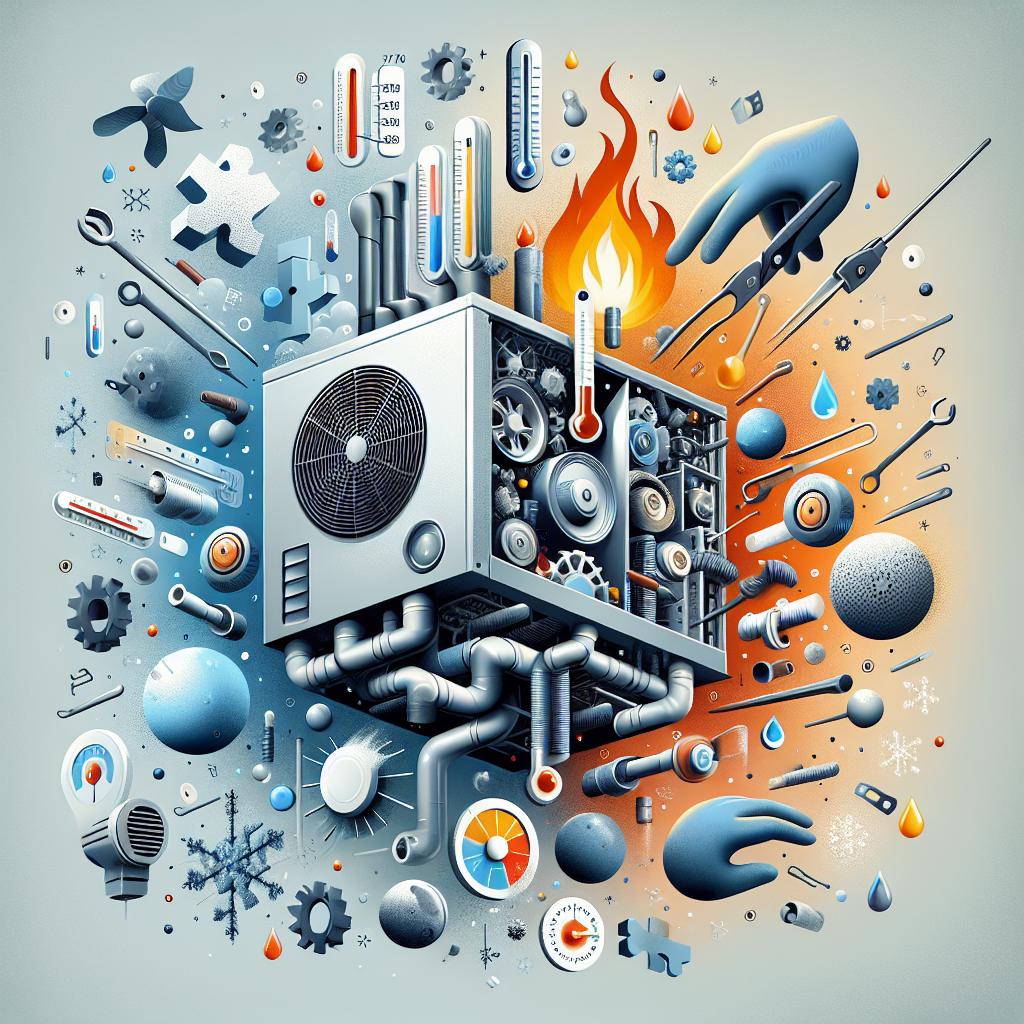In the symphony of modern life, few elements are as vital to our comfort as the hidden orchestration of heating, ventilation, and air conditioning (HVAC) systems. These intricate networks of ducts and compressors work tirelessly behind the scenes to regulate our indoor climates, providing warm refuge in winter and cool relief in summer. However, like any finely tuned instrument, they require regular care and attention to perform at their best. In this article, we will explore actionable strategies and essential tips on how to maintain your HVAC system, ensuring it operates efficiently and effectively year-round. From routine inspections to seasonal tune-ups, our guide will help you navigate the responsibilities of HVAC upkeep, promoting not just a comfortable home, but also energy efficiency and longevity for your system. Whether you’re a seasoned homeowner or a first-time renter, understanding the nuances of HVAC maintenance can make all the difference in creating a harmonious indoor environment.
Understanding the Components of Your HVAC System
To effectively maintain your heating, ventilation, and air conditioning (HVAC) system, it’s vital to comprehend its core components and how they interact. The primary elements include the furnace, air conditioning unit, ductwork, and thermostat. Each part plays a crucial role in ensuring that your home maintains optimal comfort levels throughout the year. For instance, the furnace supplies heat in colder months, while the air conditioning unit cools your space during the summer. Proper care and regular inspections can increase the lifespan and efficiency of these components, ultimately reducing energy costs and enhancing indoor air quality.
Moreover, understanding how the ductwork distributes air and the thermostat regulates temperature can help in troubleshooting common issues. Here’s a brief overview of how to maintain these components:
| Component | Maintenance Tips |
|---|---|
| Furnace | Replace filters regularly; schedule annual cleaning. |
| Air Conditioning Unit | Clean coils, check for leaks, and clear debris. |
| Ductwork | Inspect for leaks, seal gaps, and clean ducts. |
| Thermostat | Test functionality; calibrate settings as needed. |
By focusing on these foundational aspects, you can prevent common breakdowns and maintain a comfortable indoor environment. Each component’s performance significantly impacts the overall efficiency of your HVAC system, so taking the time to understand and maintain them is essential for long-term benefits.

Essential Seasonal Maintenance Practices
Seasonal maintenance is crucial for ensuring your HVAC system operates efficiently throughout the year. Start by performing a thorough inspection of your system’s components. Clean or replace the air filter regularly, ideally once a month, because a clean filter allows for better airflow and improved indoor air quality. Consider checking the outdoor condenser unit for debris, such as leaves and dirt, and clear any blockage to enhance airflow. Additionally, take a moment to inspect the refrigerant lines for any signs of wear or damage, ensuring that everything is functioning optimally.
Another essential aspect of seasonal maintenance is the care of ductwork and vents. Seal any visible leaks and ensure that all vents are open and unobstructed. Doing this improves airflow and energy efficiency, reducing wear on the unit. It’s also a great idea to schedule a professional cleaning of your ducts every few years, as this can help to eliminate accumulated dust and allergens. For added convenience, you might want to establish a maintenance schedule, indicated in the table below, to keep track of tasks throughout the year:
| Task | Frequency |
|---|---|
| Replace air filter | Monthly |
| Inspect and clean condenser | Seasonally |
| Seal ductwork | Annually |
| Professional duct cleaning | Every 3-5 years |

Identifying and Troubleshooting Common HVAC Issues
Maintaining an HVAC system can sometimes feel like a daunting task, especially when unexpected issues crop up. However, becoming familiar with certain common problems can significantly ease the troubleshooting process. Look out for inconsistent temperatures, strange noises, and odors wafting from vents. Here’s a breakdown of frequent issues you might encounter:
- Thermostat malfunction: Ensure that your thermostat is accurately calibrated and not blocked by furniture or obstructions.
- Clogged air filters: Check air filters regularly; clean or replace them to maintain optimal airflow and energy efficiency.
- Leaky ducts: Inspect your ductwork for any visible leaks as they can significantly reduce system efficiency.
To help visualize your troubleshooting process, here’s a simple guide to respond to common HVAC problems:
| Issue | Possible Solution |
|---|---|
| Inconsistent Cooling/Heating | Check thermostat settings and ensure vents are unobstructed. |
| Noisy Operation | Inspect for loose components or debris in the unit; contact a technician if necessary. |
| Increased Energy Bills | Assess insulation and schedule maintenance for potential inefficiencies. |

Upgrading and Investing in Energy Efficiency
Investing in energy efficiency within your HVAC system is not just about lowering utility bills; it’s also about enhancing comfort and sustainability in your home. A few strategic upgrades can make a significant difference. Consider the following actions to enhance the efficiency of your units:
- Install a Programmable Thermostat: Tailor your heating and cooling schedules to match your lifestyle, avoiding wasted energy.
- Upgrade to Energy Star Rated Equipment: These units meet strict energy efficiency guidelines set by the EPA, ensuring more savings.
- Seal and Insulate Ductwork: Proper sealing can prevent up to 30% of the air that moves through the duct system from leaking out.
- Regular Maintenance Services: Routine checks by a professional can help identify and rectify inefficiencies before they escalate.
In addition to upgrades, you can also implement simple practices that promote energy conservation. Consider the following suggestions to maximize the efficiency of your HVAC system:
| Practice | Benefit |
|---|---|
| Change Filters Regularly | Improves airflow and system efficiency. |
| Keep Vents Unobstructed | Ensures even distribution of air throughout your space. |
| Use Ceiling Fans | Helps circulate air, allowing for better temperature control. |
| Schedule Seasonal Inspections | Prepares your system for changing weather and reduces repair costs. |
Q&A
Q&A: How to Maintain Your HVAC System
Q1: Why is HVAC maintenance important?
A1: Maintaining your HVAC system is essential for a variety of reasons. Regular upkeep ensures efficient operation, which can lead to lower energy bills and a longer lifespan for your equipment. Additionally, a well-maintained system helps improve indoor air quality, keeping your home comfortable and healthy.
Q2: How often should I service my HVAC system?
A2: Ideally, you should schedule a professional service at least once a year for both heating and cooling systems. Spring is a great time for air conditioning maintenance, while late summer or fall is perfect for your heating system. Regular checks can catch small issues before they become costly repairs.
Q3: Can I perform any maintenance tasks myself?
A3: Absolutely! There are several tasks you can tackle on your own. Change or clean air filters every 1-3 months, keep outdoor condenser units free of debris, and check the thermostat settings for accuracy. Additionally, inspect ductwork for visible leaks or obstructions.
Q4: What signs indicate that my HVAC system needs maintenance?
A4: Pay attention to irregular sounds (like banging or rattling), fluctuating temperatures, increased energy bills, or unusual smells coming from your system. If you notice any of these symptoms, it may be time to call in a professional.
Q5: What are some common HVAC maintenance myths?
A5: One common myth is that if your system is still running, it doesn’t need maintenance. In reality, regular checks can improve efficiency and prevent breakdowns. Another myth is that cleaning the system yourself is sufficient; while DIY tasks are helpful, professional servicing is still crucial for system longevity.
Q6: How can I improve the efficiency of my HVAC system between services?
A6: There are a few simple strategies you can employ. Keep vents and registers unobstructed by furniture or drapes, use ceiling fans to help circulate air, and ensure your home is well-insulated. You may also consider zoning systems for tailored comfort and efficiency.
Q7: What should I look for in a professional HVAC technician?
A7: When choosing an HVAC technician, look for certifications and licenses, customer reviews, and experience in your specific type of system. A reputable technician should be transparent about services, offer written estimates, and be willing to answer your questions.
Q8: What are the potential consequences of neglecting HVAC maintenance?
A8: Neglecting maintenance can lead to a host of problems: decreased efficiency, higher energy bills, frequent breakdowns, and reduced air quality. Over time, this neglect can even lead to costly replacements instead of simple repairs, making it a far more expensive oversight.
Conclusion:
By regularly maintaining your HVAC system, you not only save money but also ensure that your home remains a haven of comfort. Whether you choose to DIY a few simple tasks or call in the pros, staying proactive is the key to enjoying a system that works optimally for years to come.
The Conclusion
As we wrap up our exploration of HVAC maintenance, it’s clear that keeping your heating and cooling systems in prime condition is not just a task—it’s an ongoing commitment to comfort, efficiency, and health. By incorporating these maintenance tips into your routine, you not only prolong the life of your HVAC system but also enhance the quality of the air you breathe and the overall environment in your home or workplace.
Remember, regular check-ups and a little preventive care go a long way. Just as a well-tuned engine powers a car, an efficiently maintained HVAC system drives the climate of your living space. Whether you choose to take on these tasks yourself or enlist the help of professionals, the benefits will resonate through every season. So, take a deep breath and celebrate the comfort that comes with a well-maintained HVAC system—because a little investment in upkeep today can lead to peace of mind tomorrow. Stay cool, stay warm, and most importantly, stay comfortable.

